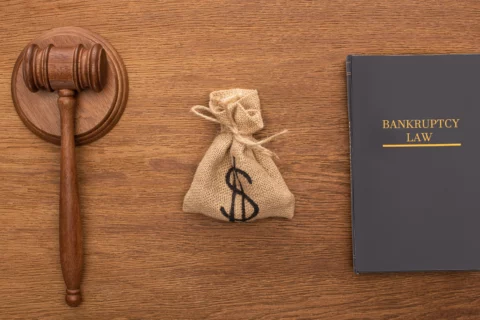A Closer Look At Nonexempt Property In Bankruptcy
I am sure you have been asked this question a lot, “Will I lose my property in bankruptcy?” Quite frankly, it can be so confusing to figure out exactly if you will have to let go of your possessions or if they are “exempt” from bankruptcy. Don’t worry; CHICAGO AREA BANKRUPTCY ATTORNEYS are here to clear the air and give you a quick overview about non-exempt property in a bankruptcy proceeding. This article will determine how non-exempt property in bankruptcy works and the related procedures.
In bankruptcy, what is a property?
Everything you possess is property. That is, even if they aren’t worth much, your possessions are “assets.” That doesn’t imply the trustee will sell all you own. No way.
The trustee may only sell assets that aren’t excluded from bankruptcy. And only if they’re worth enough to pay your unsecured creditor.
Assets may be classified into three categories (or property): personal, real (or real estate), and intangible.
- All of your “things” are considered personal property. Personal property is everything you own that is movable and touchable. That includes the bulky dresser you are unable to move without assistance. Automobiles, furniture, clothes, and jewelry are all included.
- Land or land-based property, such as a home, is considered real property. Due to their portability, mobile homes are often classified as personal property, although many timeshares are classified as real property under state law. Everything else is relatively self-explanatory.
- Intangible property. The term “intangible” refers to the fact that it is physically impossible to touch. It includes your retirement account, life insurance policy, tax refund, and cash in your bank account, among other things.
Your bankruptcy estate consists of these three sorts of assets. As such, even if the item or property is not physically in your possession, it can still be classified as either exempt or non-exempt once you file bankruptcy.
What does “non-exempt” mean?
Non-exempt property is property that is not secured from creditors in the event of bankruptcy. This does not mean that if you file for bankruptcy, you would have to give up everything. You will not. Bankruptcy is created to provide you with a fresh start, not complicate your life.
You’ll be able to exempt (protect) property designated in your state’s exemption laws, which will almost certainly include items necessary for work and household maintenance, such as:
- a little amount of equity in a vehicle
- domestic furniture and clothes
- professional equipment, and
- a retirement account.
How can I determine if I own non-exempt property?
The non-exempt property will not be included in the list of exemptions. What happens to your non-exempt property is determined by the chapter of bankruptcy in which you file.
Which Assets Are Not Exempt in Chapter 7 Bankruptcy?
In Chapter 7, you must liquidate all non-exempt property to pay off as many obligations as feasible. If the court determines that your assets are not essential to sustain a reasonable level of living, they are not exempt.
Non-exempt assets include the following:
- Vacation houses or other non-primary residences
- Automobiles that are new or pricey
- Instruments of music that you do not need for employment
- Collections of exceptional value (stamp or coin collections)
- Heirlooms (antique furniture, etc.)
- Investing in non-retirement accounts
- Excellent piece of art
- Clothing that is too expensive
- Shoes or handbags by a designer
- Jewelry that has a resale value
Numerous individuals who file for bankruptcy do not have non-exempt property. When this occurs, the bankruptcy case is classified as a “no-asset” case, which means that the trustee will not liquidate (sell) any of your personal property.
Is the Trustee Entitled to Everything?
Contrary to common opinion – and what many television programs and films represent – the bank cannot strip you naked. Your bankruptcy trustee is not permitted to sell objects of little value or necessities for living or working.
Bankruptcy under Chapter 13
You are not “liquidating” your assets in a Chapter 13 bankruptcy. This means you retain ownership of your property, but a portion of it may be subject to a fee.
Some items may only be deductible up to a particular amount of equity. While each state has its own set of restrictions, exemptions often apply to your:
- Automobile
- House
- Personal and household things.
Other types of property, such as luxury objects (a yacht or an elaborate collection), will be subject to non-exempt.
Unlike in a Chapter 7 bankruptcy, the trustee will not sell these goods. Having said that, you will be required to pay the value of non-exempt things as part of your repayment plan to satisfy your unsecured creditors.
This may be unsustainable for certain persons depending on their income and the value of their non-exempt assets. As a result, selling them would be the smartest course of action.
The amount you owe on unsecured debt (such as what is due to credit card companies) is influenced by your disposable income.
You won’t be approved for a Chapter 13 bankruptcy filing if your income is too low to sustain monthly payments.
You will continue to make payments on secured assets (such as your house and vehicle). Still, you will also pledge the property as collateral, which means that your creditor may take it back if you do not make the agreed-upon installments.
Chapter 13 bankruptcy provides a three- to five-year repayment plan to make up for missed payments, which means creditors cannot seize your vehicle or foreclose on your property during this period.
Can I keep the non-exempt property and convert it to exempt?
It’s tempting to do some exemption planning before entering bankruptcy, such as turning non-exempt property (assets you can’t preserve) into exempt assets. It is feasible if done in good faith and without any intention to cheat creditors, although it may be challenging.
Also, bankruptcy courts have reached varying decisions about how much exemption preparation is appropriate, so consult a CHICAGO AREA BANKRUPTCY ATTORNEY.
Exemption Planning
Exemption planning is the activity of structuring your finances to maximize your exemptions and safeguard your assets in bankruptcy. Conversion of non-exempt property to exempt assets is possible. Excessive exemption planning might result in criminal prosecution or opposition to your bankruptcy discharge—the order that erases eligible debt.
Conversion of Non-exempt Assets into Exempt Assets
It is feasible to arrange for exemptions before entering bankruptcy, including transforming non-exempt assets into exempt property. For example, you may utilize non-exempt bank funds to pay for necessities like rent or food. You may also sell your property to cover essential costs. In any scenario, keep track of your expenses.
You may sell the non-exempt property to buy exempt property. If you possess a boat but you have no automobile, you may want to sell your boat and get a car. First, this is logical since a vehicle is needed to commute to work, drive kids to school, and do errands. Most states exclude motor vehicles but not boats, which are considered luxury products.
If you’re thinking about bankruptcy and want to protect your assets, make sure to contact us.
We want to convey here that non-exempt property can be a tricky subject in bankruptcy. It’s not always as cut and dry as you may have thought it was, so it is worthwhile to decide what is and isn’t non-exempt.
Plus, we hope that this has been a helpful guide to non-exempt property and that you will turn to us for help if you require legal counsel regarding your bankruptcy. We are prepared to handle any number of cases from simple Chapter 7s to high-asset Chapter 13s. See us in person or call 847-443-5201 to learn more about our bankruptcy services and how we may support you during this challenging period.


